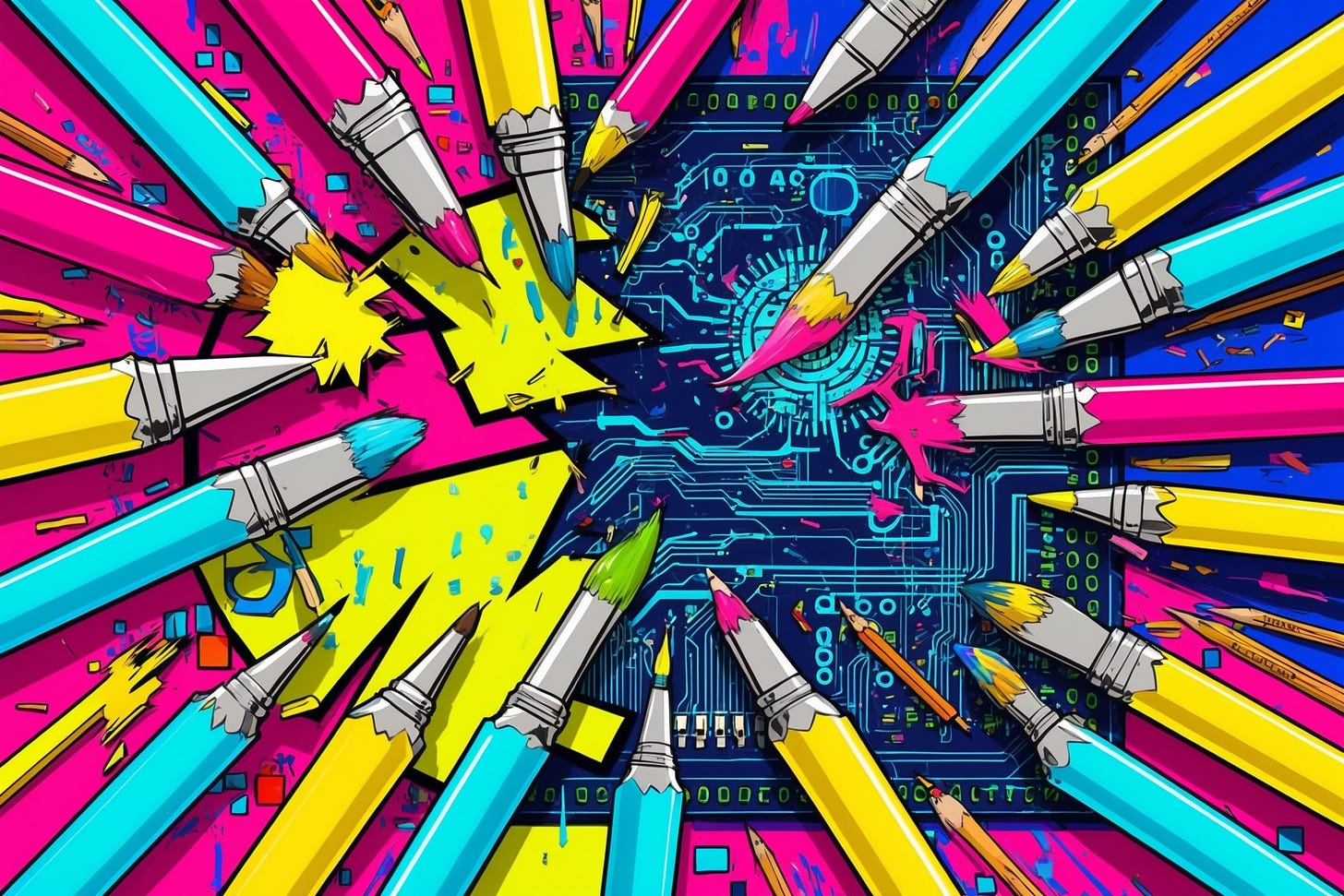Brushstrokes of Bias: When Writers and Artists Cry "AI Wolf!"
Exploring the irony of creative outrage in an era of vanishing professions
Day 6 - Thirty-day writing challenge
So as you know, the idea is for me to continue writing, making it a practice so that I can bone up on my writing craft. But while thinking about what I wanted to write today I decided to take some time to do some reading to get ideas.
I came across an article on Substack where the person, who called himself a creative, is upset about AI and what it means for “Creative People”
I want to highlight they are only upset about GenAI because it seems creatives weren't angry about AI at all until now.
It's their turn to be affected by AI potentially taking away jobs, or maybe, in their case, they think AI is stealing creative ideas ... but hasn't this always been the case with technology?
And what truly makes so-called creatives better than the rest of the world whose jobs have been taken or affected by AI?
As I sat here thinking about this, I couldn't help but notice the irony. Here I am, using a computer—likely with some form of AI assistance—to write about creatives being upset about AI.
It got me thinking about technology's impact on various professions, including the creative fields.
The Creative World's AI Awakening
In recent years, the creative world has been abuzz with controversy. Artists, writers, and musicians are up in arms about the latest technological boogeyman: Generative AI and Large Language Models (LLMs).
They cry foul !!! Claiming these new tools threaten their livelihoods and artistic integrity.
Ironically, many of these same creatives probably typed their manifestos on AI-powered smartphones or shared their outrage on social media platforms driven by sophisticated AI algorithms.
But let's take a step back and consider the bigger picture.
The Forgotten Casualties of Progress
While creatives rage against the machine, they seem to have conveniently forgotten about the countless other professions that have already fallen victim to the relentless march of progress. Remember landline operators? How about payphone attendants?
With the rise of mobile phones, these once-essential jobs vanished into thin air.
Did we hear an uproar from the creative community then? Hardly a peep.
In fact, many artists and writers likely embraced their new smartphones, using them to stay connected, manage their careers, and even create art on the go.
And it didn't stop there.
Think about the humble answering machine operator, rendered obsolete by voicemail systems. Or the camera and camcorder operators who found their skills suddenly less in demand as smartphones became everyone's pocket-sized studio.
How many creatives now rely on their phone's high-quality camera for inspiration or to document their work?
Alarm clock manufacturers? Pager operators? Portable music player producers? All swept aside by the all-in-one wonder that is the modern smartphone. The same device that many artists now use to set reminders for gallery openings, communicate with clients, or listen to music while they work.
Even professions that seemed irreplaceable have felt the sting of technological advancement. Map makers and GPS device manufacturers watched as their carefully crafted products were replaced by a simple app. Travel agents, once the gatekeepers of exotic getaways, now compete with AI-powered platforms that can plan an entire trip in seconds.
How many writers have used these very apps to research locations for their next novel?
The Creative Conundrum
So why the sudden outrage from the creative community?
Perhaps it's the fear of the unknown. The thought that a machine could replicate their unique vision, their artistic voice, is understandably unsettling. But is it really so different from the challenges faced by those in other industries?
The truth is, technology has always disrupted the status quo. It's up to us to adapt, to find new ways to showcase our humanity in an increasingly automated world. Creatives have been at the forefront of adopting new technologies—from digital cameras to graphic design software to music production tools—when it suited their needs.
Embracing the AI Canvas
Instead of fighting against the tide, perhaps creatives should embrace these new tools. After all, AI can be a powerful assistant, freeing up time for more innovative thinking and pushing the boundaries of what's possible. Just as a smartphone can be both a communication device and a creative tool, AI has the potential to enhance rather than replace human creativity.
In the end, it's not about man versus machine. It's about finding harmony between human creativity and technological advancement. The creative community has always prided itself on thinking outside the box.
Now's the time to prove it—perhaps using the very AI tools they're rallying against to create something truly revolutionary.
As I finish writing this piece, I can't help but wonder: am I any different from the creative author whose article sparked this creation? Or have I, too, been guilty of selective outrage in the past?
Whereas I have to stay up to date on the latest technology just to stay employed … hmmm
It's a humbling thought and one that reminds me that in this ever-changing technological landscape, adaptability and open-mindedness might be our most valuable skills.
Do you disagree or Agree I would love to hear your feedback on this post





I like to think of myself as a creative, and have often used AI when changing the tone in my writing or when I need help brainstorming and processing my thoughts. In this sense, AI has been a nothing short of amazing for me. While I value the creativity that my mind and imagination can conjure up, I am also appreciative of the ability that AI has to enhance my creativity by driving me to think of new perspectives and ideas.